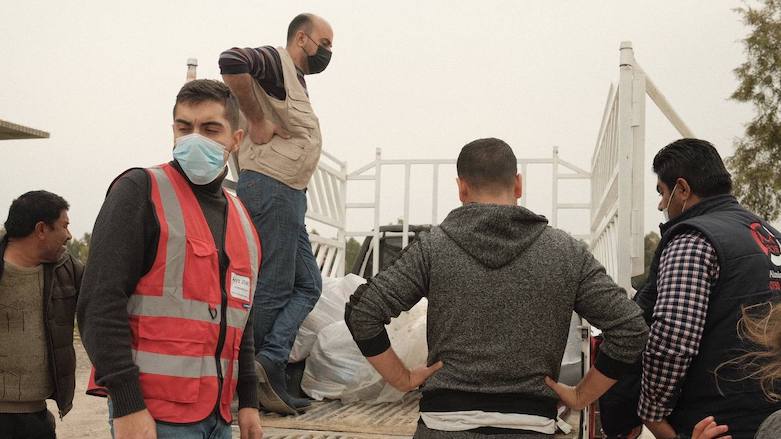French Kurdish activist brings hope to displaced Yezidis in Kurdistan
Arya Jemo’s family began helping refugees while he was still in school in France. Now 25, the Kurd from Afrin is giving back to people in need in Kurdistan.

ERBIL (Kurdistan 24) – On the wall in one of the rooms in an unfinished building in Erbil’s Ainkawa suburb hangs a picture of the holy temple in Lalish. Colorful fabrics, the same kind found in almost every Yezidi (Ezidi) home, adorn similar walls in buildings and tents now home to around 20 families, all displaced Yezidis who are receiving much-needed help from Arya Jemo, a Kurdish activist from France.
Last Thursday Jemo distributed aid to these needy families in the Kurdistan Region’s capital. The 25-year-old estimates that he has helped dozens of similar families who are struggling due to the bad economic situation in the region and the COVID-19 pandemic while aid from international NGOs has dried up in the aftermath of ISIS’s defeat.
Jemo told Kurdistan 24 that this year he decided to visit the Kurdistan Region due to a lack of humanitarian support for displaced people during the pandemic.
According to the Kurdistan Region’s Joint Crisis Coordination Center (JCC), the autonomous Kurdistan Region continues to host the largest number of refugees and displaced people in Iraq: roughly 930,000 as of the end of April.
The majority of them live with host communities, with only 27 percent in camps.
In 2019 Jemo brought aid to Kurdish refugees in Greece, the first time he had made such a trip himself. But when the COVID-19 pandemic started last year, “I knew the situation was getting bad in the camps,” he told Kurdistan 24.
“So I went back for two weeks to Greece in July 2020,” he said, bringing thousands of diapers, 50 kilograms of washing detergent, and enough food for around six months.
Now in Kurdistan, Jemo says he has reached Yezidis in a Khanke orphanage, as well as Duhok, Suleimani, and in Erbil “with the help of donations from more than 400 people that donated from more than 30 countries.”

“I work independently with anyone without financial or political interests,” he said. “I just want to help the people.”
Jemo grew up in Paris, but his family are Yezidis from the Kurdish region of Afrin in northeast Syria, which has been occupied by Turkey-backed groups since 2018.
He told Kurdistan 24 that his parents left Afrin in the 1980s and have sheltered refugees at their home in France since he was in high school. Jemo himself began helping refugees at the age of 18 after ISIS attacked Sinjar (Shingal) in 2014.
“From high school until the end of my university studies, I had war refugees in my room where I was studying,” he said. “I had to pick up refugees from the airport. After I finished my MA degree, Turkey invaded my parents' city of Afrin. I could not remain passive and stand by and do nothing.”
Jemo has a job back in France and is in the Kurdistan Region as a volunteer. “My philosophy is to help all communities because we live together, and if we want to live and grow together, we have to stick with each other,” he said.
Khidr, a displaced Yezidi living in Ainkawa, added that it was not possible yet for civilians to return to Sinjar. “There is no electricity, water, services, no work. There is nothing in Shingal and no one helps us,” he said.
“We have been here for six years. I am not in a camp, since there is no work there."
The 30-year-old said he received support in Kurdistan from people like Jemo who were willing to help “on an individual basis,” but many Yezidis could not find employment due to the poor economic situation exacerbated by ISIS and COVID-19.
Ali, another displaced Yezidi, said he did not want to return to Sinjar.
“There are six or seven parties there, and there is no security if you go there, but here there is safety,” he told Kurdistan 24.
“Our houses were destroyed, what can we do? It would be great if there was support to rebuild our houses.”
In October 2020, the federal Iraq and the autonomous Kurdistan Regional Government reached an agreement, with support from the United Nations, to “normalize” the security situation in Yezidi-majority Shingal and expel armed groups from the area, but the agreement has not been implemented.
“I've seen different communities and people and those that need the most help are Yezidis,” Jemo said. “I have seen them living in the slums and they cannot go back to Sinjar because of the political games that are happening between different religious groups and political parties.”
“This has been going on for seven years, and they cannot really go back because there is no rebuilding or services there. The Yezidis are really living in a difficult situation and don’t have hope for the future.”
Editing by Joanne Stocker-Kelly